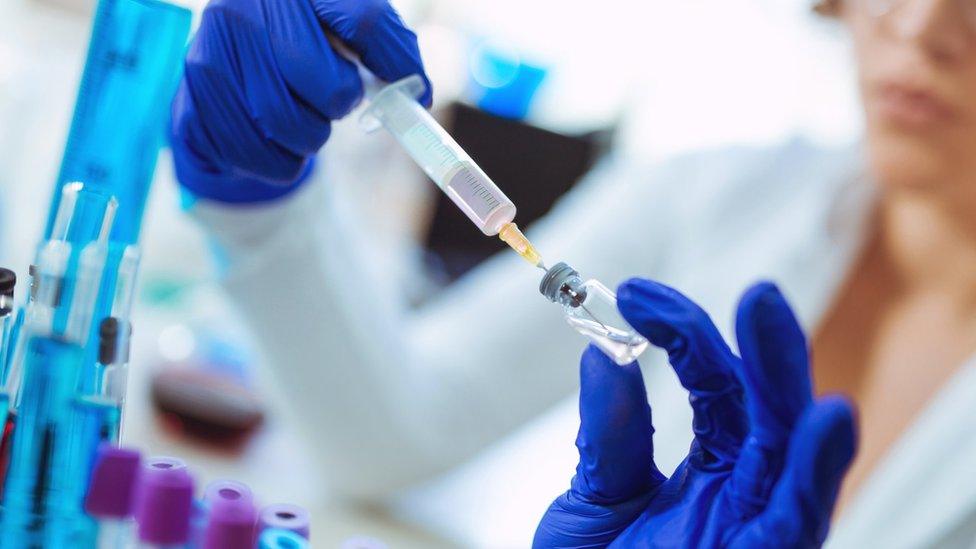Coronavirus vaccine: Target of a million doses by September, scientists say
- Published
- comments

Scientists at the University of Oxford say they should have at least a million doses of a coronavirus vaccine by September this year.
The UK government, which is backing the project, said there were "no guarantees" and it was not possible to put a date on a vaccine.
The first patients are expected to take part in the Oxford trials next week.
However, it is still too soon to know whether it will be either safe or effective.
Most experts still estimate it will take 12 to 18 months to develop and manufacture a vaccine.
What is a coronavirus vaccine?
Vaccines train the immune system to prevent people developing a disease, such as Covid-19.
If enough people become immune then the coronavirus would not be able to spread so effectively and social distancing measures would no longer be necessary.
Approximately 80 groups around the world, including major pharmaceutical companies, are trying to develop a vaccine and some have already begun human trials.
This research is taking place at unprecedented speed - years of work are being condensed into months.

A SIMPLE GUIDE: How do I protect myself?
AVOIDING CONTACT: The rules on self-isolation and exercise
LOOK-UP TOOL: Check cases in your area

What have Oxford done?
The team at the University of Oxford had been preparing for an event like the Covid-19 pandemic before the current global outbreak.
They had already created a genetically engineered chimpanzee virus that would form the basis for the new vaccine. They then combined it with parts of the new coronavirus.
The result is, hopefully, a safe virus that trains the immune system to fight Covid-19.
The big question is whether this experimental vaccine will actually work.
Prof Sarah Gilbert, the lead researcher developing the vaccine, says she is 80% sure it will.
"This is my view, because I've worked with this technology a lot, and I've worked on the Mers-vaccine trials [another type of coronavirus], and I've seen what that can do.
"And, I think, it has a very strong chance of working."
When will it be ready?
The team are already putting plans in place to mass produce the vaccine, even before they know whether it will work.
"The aim is to have at least a million doses by about September, once you know the vaccine efficacy results and then move even faster from there," said Prof Adrian Hill, who runs the Jenner Institute at Oxford, .
"It's pretty clear the world is going to need hundreds of millions of doses, ideally by the end of this year, to end this pandemic, to lead us out of lockdown.
He described a million doses as a "fairly modest target" and vaccines as "the exit strategy" for coronavirus.
When will we know the results?
The researchers hope to know if their vaccine is effective in the next few months.
However, the success of lockdown could prove a stumbling block, as if the number of coronavirus cases fall, then it will take longer to know whether the vaccine is effective.
There are discussions about whether it would be safe to deliberately infect people in order to get answers faster.
What is the government doing?
The government has created a coronavirus taskforce to support the rapid development and manufacture of a vaccine.
Business Secretary Alok Sharma said a vaccine was a "colossal undertaking" and there "are no guarantees".
"But the government is backing our scientists, betting big to maximise the chance of success," he said.
It is funding 21 new research projects and is working to scale up manufacturing so a vaccine could be produced in mass quantities.
Chief scientific adviser Sir Patrick Vallance, who will lead the taskforce, said it was important to remember that the successful vaccine could come from anywhere.
Sir Patrick said: "Just to put some realism on vaccine development, each single project does not have a high probability of success.
"So although everyone goes out with great enthusiasm and we hope they work, it's never the case that you know you've got a vaccine that's going to work."
It remains the view of scientists advising the UK government and of the World Health Organization that 12-18 months is a more realistic timescale for a vaccine.
Follow James on Twitter, external